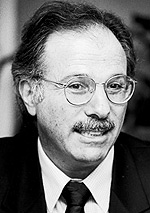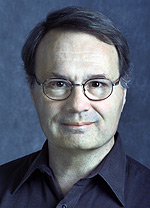Berkeleyan
George Breslauer named executive dean of L&S
He'll run the campus's largest academic entity. Meanwhile, Charles Harris has become dean in Chemistry
![]()
| 03 August 2005
George W. Breslauer, a political scientist and currently a divisional dean within the College of Letters and Science, has been appointed the college's executive dean, effective Aug. 1. He fills the post vacated by Ralph Hexter, a professor of classics and comparative literature who recently became president of Hampshire College in Massachusetts.
 George Breslauer |
In addition, as head of the campus's largest academic unit, Breslauer will oversee the college's shared operations, such as computing services, finance, and administration. He also will be a key figure in fundraising and alumni relations.
"UC Berkeley is the only public research university that goes head-to-head with Harvard, Stanford, Princeton, Cal Tech, MIT, Yale, and Chicago in competing for faculty, graduate students, and undergrads," said Breslauer. "We bear an immense responsibility to ensure that the heart and soul of our university — the College of Letters and Science — continues to flourish as a national and international leader in research and teaching."
He noted that the college comprises more than half the campus's faculty members, half the students pursuing Ph.D.s and more than three-quarters of Berkeley's undergraduates. The college is home to 66 bachelor degree programs, 50 doctoral programs, and 28 master's degree programs. The most recent National Research Council rankings placed Berkeley first nationally, with 35 of its 36 evaluated programs ranked in the top 10 — 26 of them in the College of Letters and Science.
"The challenges facing the college in the near term are to maintain and expand this excellence," said Breslauer. "The challenges are intense, for we operate in a relentlessly competitive environment vis-a-vis our real comparison group: the leading private research universities."
The College of Letters and Science expects to work with the central campus administration on a plan to raise at least $1 billion in the next seven years to support the college's faculty research, graduate-student recruitment, facilities improvements, undergraduate financial aid, undergraduate research opportunities, and multidisciplinary research initiatives, Breslauer said. He added that it also will be important to foster racial and ethnic diversity among the college's faculty, staff, and students by inducing highly qualified minority candidates to apply to Berkeley and accept its offers of employment or enrollment.
Breslauer, who joined the Berkeley faculty in 1971, spent 11 years as chair of the Center for Slavic and Eastern European Studies before being named dean of the Division of Social Sciences. He also served three years as chair of the political science department.
He has written or edited 12 books. His latest, Gorbachev and Yeltsin as Leaders, published in 2002, examined the role of leadership in the fall of Soviet communism and in Russia's tumultuous efforts during the 1990s to build an alternative political and economic system.
Harris sees new opportunities
Charles B. Harris, a world-renowned physical chemist who studies ultrafast chemical processes (10 to 12 seconds), is, as of July 1, the new dean of the College of Chemistry and the Gilbert Newton Lewis Professor of Chemistry.
 Charles Harris |
"One of my goals over the next five years," Harris told the Berkeleyan last year, when this appointment was first announced by then-Chancellor Robert Berdahl, "will be to build a materials chemistry program, for both graduate students and undergraduates, that will focus, in a highly interdisciplinary way, on nanomaterials, biomaterials, and polymers." Harris will have the opportunity to recruit additional faculty for the College of Chemistry by working closely with leaders of the new campuswide initiative on nanotechnology, one of five "New Ideas" initiatives to emerge from Berkeley's Strategic Academic Plan of 2002.

